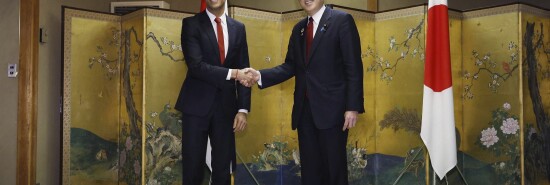
Rishi Sunak’s Japan outreach is limited by his China policy
Tom Rogan
British Prime Minister Rishi Sunak held a productive meeting with his Japanese counterpart Fumio Kishida in Hiroshima on Thursday. Coming before the start of the G-7 summit on Friday, it saw the announcement of a new “Hiroshima Accord” between Japan and the U.K.
This accord centers on boosting the two nations’ cooperation on defense matters, cyber operations, artificial intelligence, semiconductor supply chains, and clean energy. It furthers the mutual military access agreement that Sunak and Kishida announced in January. The U.K., Japan, and Italy are also working together to develop a new fighter jet. These are welcome developments. The U.K. is America’s closest ally. Japan is one of America’s closest allies and, depending on what occurs in the years ahead, may even replace the U.K. as the closest U.S. ally. Regardless, greater cooperation between these two nations is positive.
Still, there is a limit to how far Sunak will be able to strengthen his partnership with Japan.
TAX PREPARATION INDUSTRY PUSHES BACK AGAINST IRS PILOT PROGRAM
Taiwan explains why.
Top line: The U.K. and Japan are not aligned in the urgency of their concerns over a prospective Chinese invasion of Taiwan. Sunak disagrees with this assessment. He told reporters on Thursday that the U.K.’s “approach to Taiwan is long-standing and it hasn’t changed. And again, it’s an approach that is completely aligned in substance and in language with all our allies.”
It sounds good, but it’s inaccurate. While the Hiroshima Accord does mention a shared interest in maintaining peace across the Taiwan Strait, the devil is in the actionable details. And the details show that Japan is taking far more proactive military steps than the U.K. to prepare for a conflict over Taiwan. Japan is also speaking plainly about the need for the international community to deter any attack.
In contrast, Sunak’s government is attempting to have it both ways over Taiwan: wooing Japan while carefully avoiding its alienation of China. Just this week, Sunak abandoned a pledge to shutter Chinese Communist Party-aligned Confucius Institutes in the U.K. And Sunak’s foreign secretary recently used his annual keynote address to seek a positive reset in London’s relations with Beijing. Unlike Japan, the U.K. has not directly condemned China’s escalating military intimidation of the island democracy.
For Japan, the U.K.’s stance can’t justify it establishing the very closest of partnerships with London. China’s threat to Taiwan, after all, is seen in Tokyo as an extension of China’s threat to Japan. China seems determined to play up this perception, sending escalating flotillas of warships around Japan’s three main islands. Yes, Sunak might now have pledged to deploy a U.K. carrier strike group to the Indo-Pacific in 2025, but Japan will note that this deployment isn’t scheduled for 2024. Tokyo may suspect that this delay might be because Sunak wishes to avoid aggravating China amid coming tensions over Taiwan’s January 2024 presidential elections.
To be sure, Sunak will be received by Japan at this G-7 summit with far more favor than that which meets French President Emmanuel Macron. His never-ending and inane spinning of prior comments notwithstanding, Macron has made clear that France’s commercial relations with China now trump its Pacific alliances. But unless and until Sunak makes clear that he is willing to consider using force in Japan’s and Taiwan’s defense (the U.K. has forces that would significantly complement any defense), this partnership will have inherent limits.
